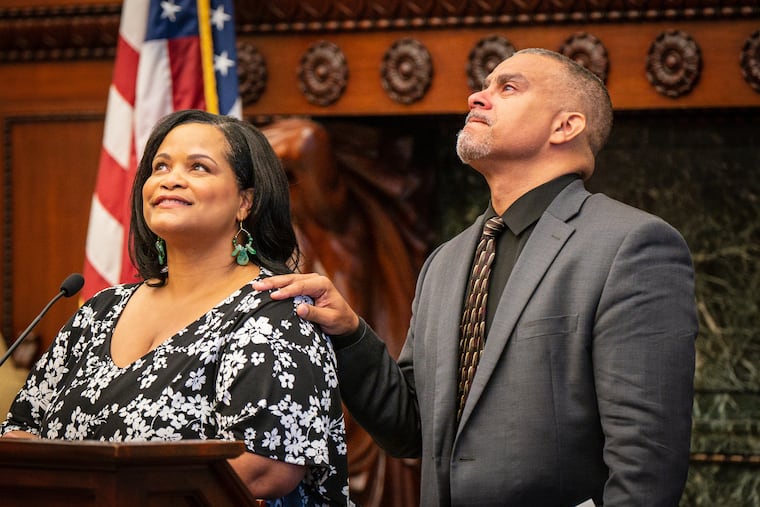Philadelphia officials remember Joseph Certaine as a political powerhouse and ‘the heart of the city’
Certaine worked under three Philadelphia mayors, advised countless political campaigns, and was a longtime civil rights and racial justice activist.

Joseph Certaine had just suffered a heart attack and was lying in a hospital when his family held a phone to his ear. They weren’t sure whether he was able to hear who had left him a voicemail. But they were sure going to try.
“Joe, this is your old boss,” Ed Rendell, the former Philadelphia mayor and Pennsylvania governor, breathed into the phone. “We can’t afford to lose you. We got too many fights left to fight.”
Certaine blinked, as if to acknowledge Rendell’s plea. Three days later, on July 27, he died at age 76. It was just three months after his wife, LaTanya, had passed away.
“This time, my mom pulled rank over [Rendell],” said Certaine’s son, Todd Stewart. “She said, ‘Joe, it’s time to come home and be with me.’”
For four decades, Certaine was a titan of Democratic politics in Philadelphia. He was a veteran operative and strategist who advised countless campaigns. He worked for three mayors and was Rendell’s managing director — the city’s highest unelected position — from 1994 to 2000. And he was an activist with a passion for civil rights, voter engagement, and Black history.
Dozens of family, friends, current and former City Hall staff members, and elected officials gathered Thursday to remember Certaine during a memorial service in the Mayor’s Reception Room, a place Stewart described as a “grand hall befitting the stature of my dad.”
Among the speakers were Mayor Jim Kenney, U.S. Rep. Dwight Evans, and City Councilmember Cindy Bass, each of whom spoke glowingly about Certaine’s political acumen and his ability to improve how city services were delivered. In a statement read at the service, David L. Cohen — Rendell’s former chief of staff and the current U.S. ambassador to Canada — called Certaine “the heart of the city.”
Many at the memorial agreed that Certaine probably would have hated it.
Not because it wasn’t nice, or fond, or emotional — the hour in City Hall was all of those things — but because Certaine didn’t like to make his work about himself. He was a doer — a no-nonsense, straightforward, hands-on type who’d rather get a task done than make a big fuss about it.
“He had an ability to communicate in a way that really left no doubt and no uncertainty,” Bass said. She recalled that, last year, when she’d dug in her heels during budget negotiations to try to squeeze more funding for parks and libraries in her district, Certaine called her and urged: Don’t back down. Bass said it gave her resolve.
“You’d rather fight the entirety of City Hall than disappoint Joe,” she said.
Rendell also alluded to Certaine’s tendency to wave away credit, saying in a statement that, “Joe did not need his title.”
“Hundreds of thousands of people who never met him, who may never have heard his name, will miss his leadership most of all,” he said. Rendell, 79, did not attend the memorial Thursday, saying in a statement read by his former aide, John Estey, that Parkinson’s disease “some days renders me almost immobile.”
» READ MORE: From 2016: Certaine led an effort to preserve the Bethel Burying Ground in Queen Village
Certaine, who was raised in the foster system, got his start in community activism in the 1970s as a block captain. In 1980, he joined the National Black Empowerment Council as a political strategist, and in 1981, he was hired to work on affirmative action in the city’s housing office under then-Mayor William J. Green III. He worked for years on emergency management, coordinating large events and demonstrations under Mayor Wilson Goode, and then held the top job under Rendell.
His departure from city government was not the end of his work in politics and advocacy.
“Joe may have stopped being the managing director,” said Tumar Alexander, who now holds the post, “but he never stopped working.”
In the mid-2010s, he led an effort to preserve the Bethel Burying Grounds, a 19th-century cemetery in Queen Village that was established by the African Methodist Episcopal Church.
And Certaine has been deeply involved in voting rights, including as the operations director for the Pennsylvania Voter Rights Coalition and as founder of the Octavius Catto Voter Empowerment Initiative. In 2020, he organized volunteers to fight against voter suppression.
Stewart urged those who knew Certaine to carry on his father’s commitment to justice and make “visible the people that were invisible” by organizing on behalf of marginalized communities.
“Now, it’s our turn,” he said, looking up. “We’ve got this.”